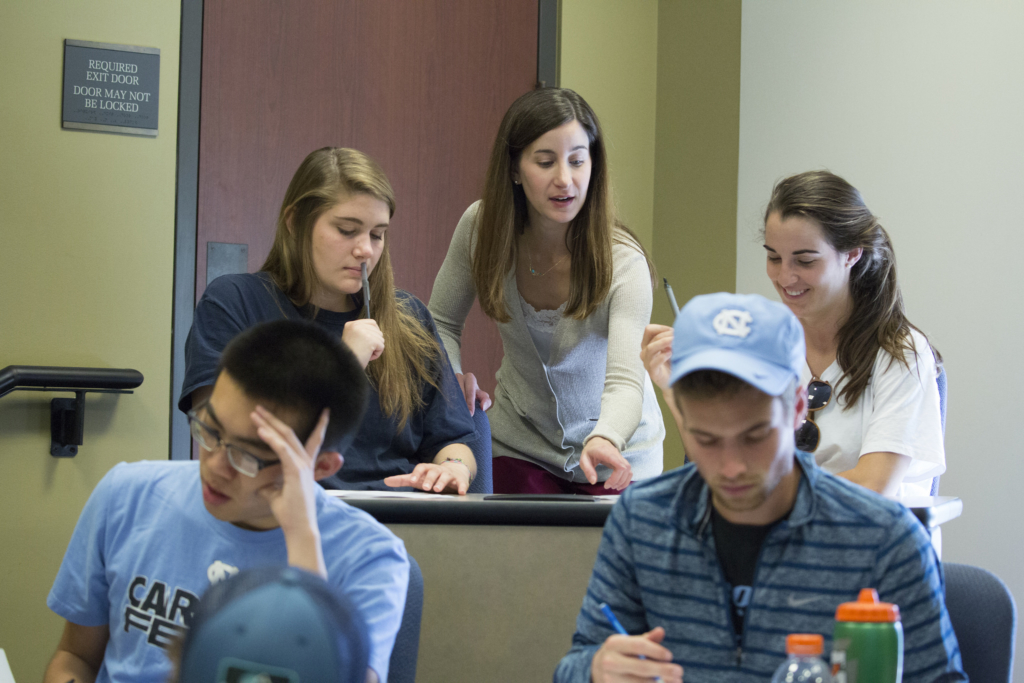
Jessica Christian, a professor at the University of North Carolina’s Kenan-Flagler Business School, working with students. Photo courtesy of Kenan-Flagler
Over the last three years, Kenan-Flagler Business School at the University of North Carolina at Chapel Hill has rejected almost 50% of all applicants — and school administrators haven’t liked doing it. As part of a plan to accept more talent into the ranks of its two-year program, the school is in the final stages of approving a business school-specific fee.
If the new proposal passes, starting next fall, business majors at UNC will pay a $2,000-per-year fee on top of their tuition, while business minors will pay $1,000 per year, with a four-semester cap on the fee.
“Our peer public business schools all have similar business school-specific fees or incremental tuition,” says Douglas Shackelford, dean of the Kenan-Flagler School. “We are late to the game.”
Indeed, many other top schools already have similar fees in place for business majors. Students at Arizona State University’s W. P. Carey School of Business, for example, pay $1,050 per year in program fees over the course of their undergraduate studies. At Georgia Tech’s Scheller School, students pay what’s called an Institute Specific Fee of $544 per semester, or $1,088 per year. Undergrad business majors at the Wharton School at the University of Pennsylvania’s currently pay $5,120 in fees on top of their tuition over the course of their studies, while students at New York University’s Stern School of Business pay $3,616 in fees for their undergraduate business education.
Right now the total cost of attending Kenan-Flagler while living on campus is $23,734 a year for North Carolina residents. Out of the Poets&Quants Top Undergraduate Business Schools of 2017, Kenan-Flagler had the ninth lowest cost out of the 82 schools ranked for in-state residents. Indiana University’s Kelley School of Business was the only other top 10 school with a lower total cost of attendance.

Dean Doug Shackelford. Kenan-Flagler photo
UNDERGRAD POPULATION TO INCREASE FROM 400 TO 600 PER CLASS
Shackelford says school administrators have been brainstorming ways to expand the undergraduate program for past last five years when they recognized that many students were being dissuaded from applying to the undergraduate business program due to the low admit rate. Between 2013 and 2017, the school even saw an 11% increase in application volume. As a two-year program, students already enrolled at UNC apply to the program during their sophomore year.
The school began the fee approval process in the summer of 2016, and will put it to a final board vote next month (March 2018), where it needs the majority of 28 members’ approval to pass. With the increased funding from the fees potentially starting in 2018, the school hopes to turn down fewer high-achieving students with high GPA and SAT scores. They currently have about 350 business majors and 50 minors and the fee will be used for staff and student support.
“Over the next eight years, we plan to expand the program by 50%,” Shackelford explains. “With a gradual increase from 400 majors and minors to 600 per class, we need more educators and administrators to support the students better.”
With this planned expansion, the dean adds that there are plans for a new building for the business school as well and they are in the midst of capital building and fundraising.
INCREASED OUTREACH TO FRESHMEN COMING FROM ‘A DISADVANTAGED BACKGROUND’
In order to get to this stage of the fee approval, Dean Shackelford says the school has held multiple meetings with current students, alumni, parents of students, the staff, and the school’s board of trustees. He says that he believes the fee will not deter students from applying, rather, the school community is preparing for an increase in application volume.
However, if passed, the school will waive the fee for students receiving financial aid. Currently, about 25% of undergrads at Kenan-Flagler receive financial aid. With the expansion proposal, the school forecasts a growth to 35%.
According to school numbers, 15% of students at Kenan-Flagler identify as an underrepresented minority and 9% are first-generation college students. With this fee proposal, the school also plans to increase outreach to incoming freshmen from disadvantaged high schools to assist in application prep before their second year.
“The students’ performances as freshmen weigh heavily and students that come from an advantageous high school have lots of AP (advanced placement) credits,” Shackelford says. “If they come from a disadvantaged background, they may need to do remedial work instead of jumping into advanced courses. We plan to begin identifying disadvantaged freshmen who are interested in business to help them step forward.”
ADDED USE OF ARTIFICIAL INTELLIGENCE AND VIRTUAL REALITY ON THE WAY
On top of handing out more undergraduate business degrees, Kenan-Flagler also plans to use funds from the fees to provide more global opportunities and student support services like leadership programming and career coaching. To continue providing the bigger class with a top-notch education, the dean says that the school is also planning to beef up the use of emerging technology. Students joining the school can expect to learn and use more artificial intelligence and virtual reality technologies during their time at the school.
Dean Shackelford, who is a graduate of the UNC Kenan-Flagler undergraduate business program himself, says that one of the hardest days of the year is when they release decisions and have to disappoint so many students and their families. “It’s heartbreaking to turn away so many talented, qualified students,” he says.
DON’T MISS: AT KENAN-FLAGLER, A BIG SWIG OF AWARENESS or B-SCHOOL: WHAT IT COSTS AND WHAT GRADUATES MAKE











Questions about this article? Email us or leave a comment below.